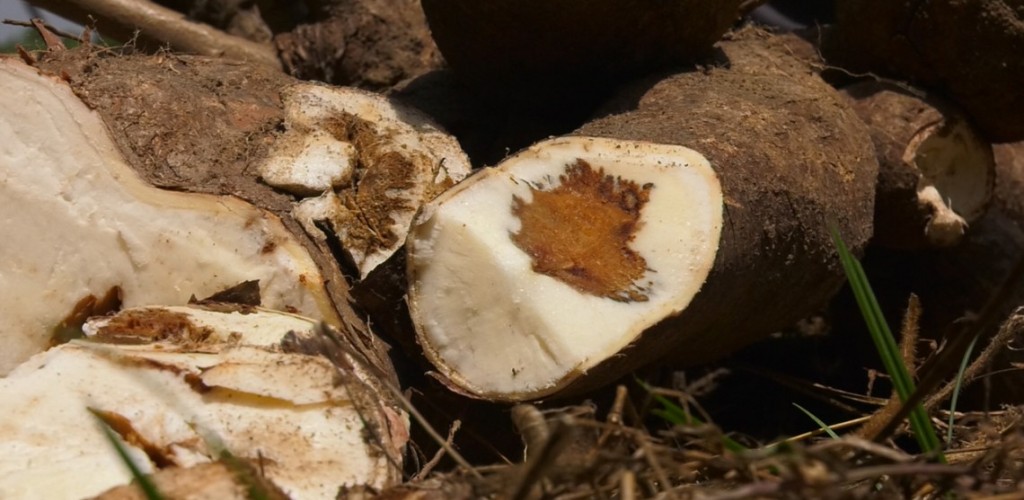“This one is diseased … this one is diseased. They are infected. Even if you take out the roots, they will be rotten,” said Simon Mafumbo as he paced through his cassava plantation in Tanzania’s Northern Misungwi district, just off the shores of Lake Victoria.
Mafumbo is one of millions of Tanzania cassava farmers who in 2018 lost their entire crop to two viruses for which there is neither cure nor vaccine.
These viruses, and efforts to combat them through plant breeding, are the subject of a new Cornell University documentary film produced by International Programs in the College of Agriculture and Life Sciences (IP-CALS) in collaboration with the Tanzania Agricultural Research Institute for the Next Generation Cassava Breeding project. The film features stories from Tanzanian cassava farmers and agricultural scientists in the NextGen project who are devoting their careers to improving cassava production by enhancing disease resistance and cooking quality. NextGen’s international partners include IP-CALS and the Boyce Thompson Institute (BTI), located on Cornell’s campus.
Cassava is consumed by more than 500 million people daily across the African continent. According to the United Nations’ Food and Agriculture Organization, cassava is the second most important staple in sub-Saharan Africa and a major source of calories for two out of five Africans. Scientists fear that cassava brown streak disease, which is currently endemic to East Africa, may spread west toward Nigeria and Ghana. This would trigger an international cassava shortage and severely affect tens of millions of smallholder cassava producers.
Rosemary Francis, a cassava farmer in Mwanza, Tanzania, has entrepreneurial aspirations, but old cassava varieties are holding her back. “I sell these crops to send my children to school. If I get newer seeds that would help me a lot,” Francis said. “I would be able to sell the seeds and roots. I would be able to make flour. Please bring us the varieties that suit our needs so we can reduce the problems we are struggling with now.”
The 18-minute documentary was shot in various locations in Tanzania in March 2018 by Chris Knight, videographer with the Cornell Science Media Production Center, in collaboration with Heneriko Kulembeka, plant breeder and NextGen cassava coordinator at the Ukiriguru Tanzania Agricultural Research Institute center in Mwanza.
“We wanted a film that sheds light on farmers’ challenges in overcoming the crop disease in their cassava fields, and how NextGen’s efforts to develop new varieties are benefitting their families’ livelihoods,” said Kulembeka.
“The film also examines the complex integrative solutions that are being developed open source in the public sector to help solve these challenges,” said Knight. “NextGen Cassava is a great example of how CALS researchers and partners are internationally engaged in Cornell’s mission of knowledge with a public purpose.”
NextGen aims to significantly increase the rate of genetic gain in cassava breeding through the use of a predictive technology called genomic selection. By training statistical models to identify desired traits like disease resistance and root quality, breeders aim to rapidly identify promising parent plants and develop varieties that meet farmers’ needs.
“Genomic selection uses the performance of the parents to predict the performance of the progenies, or offspring,” said Chiedozie Egesi, plant breeder and project manager of NextGen Cassava. “Tanzania has one of the foremost cassava breeding programs in Africa. Because Tanzania shares African cassava germplasm, they will benefit from the genomic predictions that NextGen has already developed, use of the NextGen Cassavabase database and capacity for improved phenotyping.”
Cassavabase, an open-access online repository for information from cassava breeding trials, was developed and is supported by the Lukas Mueller Lab at BTI in collaboration with NextGen African project partners.
NextGen is a partnership that spans three continents. In North America, project partners are IP-CALS, BTI, United States Agricultural Research Service and the University of Hawaii. The project’s African partners are the International Institute of Tropical Agriculture and National Root Crops Research Institute breeding centers in Nigeria; the National Crops Resources Research Institute and Makerere University in Uganda; the West African Centre for Crop Improvement in Ghana; and the Tanzania Agricultural Research Institute in Tanzania. South American partners include Embrapa in Brazil and the International Center for Tropical Agriculture in Colombia.
NextGen’s current – and second – phase is funded by a $35 million grant from the Bill & Melinda Gates Foundation and U.K. aid from the U.K. government.
Linda McCandless is associate director of communications for IP-CALS. This story was written in collaboration with videographer Chris Knight.






